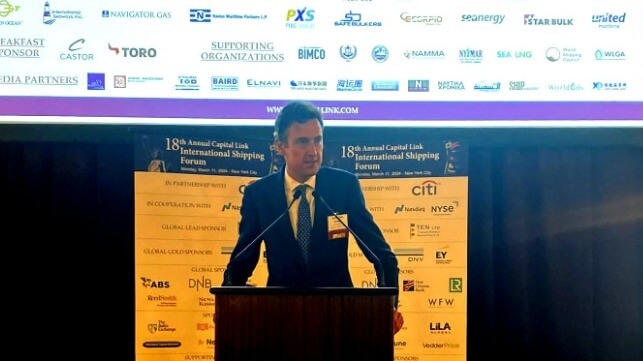Alexander Saverys Challenges Industry’s Approach to the Future

While the shipping industry is optimistic about the near-term outlook despite many of the well-publicized challenges, Alexander Saverys, CEO of CMB and now Euronav, however, challenged the industry to think differently about its future. Appearing as the keynote speaker for the Capital Link Forum, he reiterated his vision of the opportunities instead of challenges with decarbonization, a topic that consumed much of the discussion during the day-long event in New York City.
A few consistent themes emerge as executives and the financial community discuss the future and their outlook. The biggest concerns are the steps required and potential impact of environmental regulations and the uncertainties that remain over key elements including future fuels. Most agree that the near-term goals for emissions reductions of 30 percent by 2030 are very achievable with the options at hand. They point to vessel refits as the easiest options increasing efficiencies through management systems, alterations to bows and their bulbs, adding ducts and changing propellers, as well as new efficient hull treatments and paint.
The uncertainty comes in the second phase of carbon reductions where owners highlight that they are being forced to make vessel investments with new orders before the solutions are settled. Waiting they point out means being too late. The view is that there will be no one fuel solution and that the industry will still need cooperation across sectors and government support. They accept and expect carbon fees while calling for a universal as opposed to a regional approach.
Alex Saverys however in his keynote took the stage in front of analysts who have been unsupportive and critical of CMB’s response to John Fredricksen’s overtures to Euronav and was unapologetic not only defending his family’s approach but challenging the industry about how it looks at the future. He spoke after a tumultuous nearly two years in which they opposed the merger of Frontline and Euronav. Ultimately, they completed possibly one of the biggest asset transactions ever in the industry selling Frontline 24 VLCCs while acquiring full control of Euronav and then merging the company with CMB.TECH to execute the family’s vision of diversification and decarbonization.
“We believe pure-play shipping is a thing of the past,” declared Saverys defending their approach. “Regulations will not go away,” he highlighted saying that they “see a huge opportunity in decarbonization.”
He called the $50 billion investment required to take shipping green achievable saying instead of seeing it as a threat for the industry and his company, it is a “huge opportunity.” He said it is all about how the industry adapts to the changing environment. He described a strategy of diversification for the new company which will be CMB.TECH with Euronav as its crude oil tanker division along with its operations in bulkers, chemical tankers, service vessels for offshore wind, and a growing fleet of alternative fuel vessels. He said their focus is hydrogen for smaller ships and ammonia for larger with an approach of using carbon to decarbonize and produce a “future-proof” company.
While analysts repeatedly cautioned about the uncertainties and said that things can change rapidly in the shipping world, the consensus at the Capital Link Forum was positive with most sectors pointing to an ongoing upcycle supported by limited new tonnage in the near term. Product tankers said the sector was “doing fantastic,” and the market is in a great position for the next few years, while gas carriers pointed to the continued strong demand for LNG noting LPG is expected to be a bigger part of the mix and the potential for ammonia is significant especially as existing gas carriers can also serve the emerging market. Even the beleaguered container segment highlights that overcapacity is being consumed by the diversions away from the Red Sea while smaller ships and feeders are a stronger subsegment as the major carriers consolidated and focused on large ships.
All the sectors, except, containerships, point to the relatively limited orderbooks for new ships and the long lead time to get new tonnage. For example, there are only five to six new VLCC tankers expected in the next two years as the oil sector has begun what analysts see as a strong upcycle.
They point to the lack of building slots for many classes of ships till 2027 or beyond. The shipbuilding challenges will not improve either as they highlight there is no country with the available deepwater, infrastructure, and attractive labor market making it possible to challenge China and Korea’s dominant position in shipbuilding.
They point to the need for overarching strategies to address the challenges of decarbonization noting with product tankers for example saying that the IMO is the reason that orders are currently so low in their segment and others. Yet, they also welcome that there is a single global regulator while calling for greater industry cooperation and noting there is a lot of passion on decarbonization that could be used to achieve what is possible. For the segments that interact with consumers or have long-term charters, they point to the opportunities of customer partnerships and investments to help achieve what will be required.
Much uncertainty however remains with most predictions saying that the problems in the Red Sea will persist and noting political challenges such as how Europe will handle the future of the Russian sanctions if there is a resolution in Ukraine. The one thing that they felt is certain is the rapid change and unpredictability of factors that impact shipping operations.
The opinions expressed herein are the author's and not necessarily those of The Maritime Executive.
